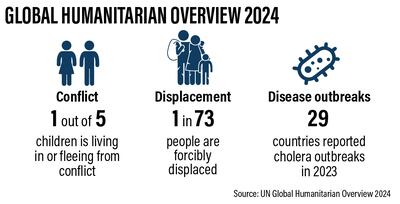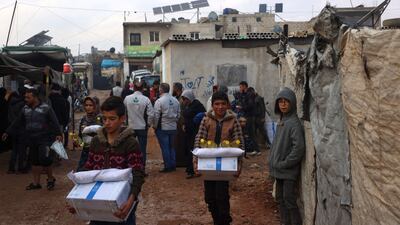In 2024, 300 million people across 72 countries will need humanitarian assistance as climate change, displacement and conflict push more people to the brink of famine, a UN report published on Monday found.
The UN and partners are appealing for $46.4 billion to help reach 180.5 million of the 300 million people who are most in need of life-saving assistance, double the amount sought four years ago.
“This figure has been arrived at by a process in every single country where we operate, where humanitarian agencies operate, by looking at the levels of need, counting the populations in need, compiling lists, analysing them, seeing who's in need of what,” UN aid chief Martin Griffiths told reporters.
“There has been an enormous effort made by humanitarian agencies in every single one of those countries to limit our focus on the very, very direst needs.”

The Mena region, where continuing geopolitical tension is fuelling large-scale displacements, resource shortages and severe humanitarian crises, requires $13.9 billion in funding to address the needs of 53 million people, marking the highest funding requirement among all regions.
It constitutes 30 per cent of the 2024 Global Humanitarian Overview, the UN said.
“The Middle East as a whole, adding Gaza and West Bank in, is probably going to be the area of greatest need,” Mr Griffiths said.
Specifically, three countries have appeals for more than $1 billion – the Occupied Palestinian territories, Syria and Yemen.
Across the region, 50 million people are displaced in their own countries or as refugees across borders, leading to overcrowded camps and strained host communities.
More than 40 million people need urgent support, according to the UN’s humanitarian partners.
The number of food-insecure people has increased by 20 per cent across the region over the past three years – reaching more than 41 million.
The unemployment rate is about 10.67 per cent, with Palestine, Libya and Jordan having the region's highest rates.
More than 31 per cent of the population of Mena are living under the poverty line, with Yemen, Syria, and Egypt having the highest rates.
The 2024 appeal is “quite a considerable reduction” to the $57 billion in 2023, Mr Griffiths said.
“You can imagine what hard work it has been to reduce those numbers, to persuade agencies to come down, to be realistic, to be focused, to be tough-minded about what we are really going to be able to achieve,” he said.
This year, donor funding led to the largest financing deficit for the UN, with unmet financial needs passing one third of the required $57 billion for 2023, OCHA said in its annual assessment of global humanitarian needs.
“If we cannot provide more help in 2024, people will pay for it with their lives,” said Mr Griffiths.
Because of the lack of funding, 10 million people in Afghanistan lost access to food assistance between May and November.
In Yemen, more than 80 per cent of people focused on for assistance do not have proper water and sanitation.
Unlike in other parts of the UN where fees depend on countries' economic size, humanitarian funding is voluntary and relies overwhelmingly on 10 top donors who provide about 60 to 80 per cent of the total amount.
The US is by far the biggest donor, giving $15 billion so far this year, followed by Germany, the European Commission and Japan.
“As we come out of the Cop28, the climate community is a community of enormous activism and energy," Mr Griffiths said.
"It is a community that insists on its rights and the importance of its objectives, existentially for the world. We need to be like that.
“We need money. We need safety. We need international humanitarian law.
"And we need activism to remind people that actually, humanitarian operations are a sign and a signal and a symptom of the greatest humanity.”


